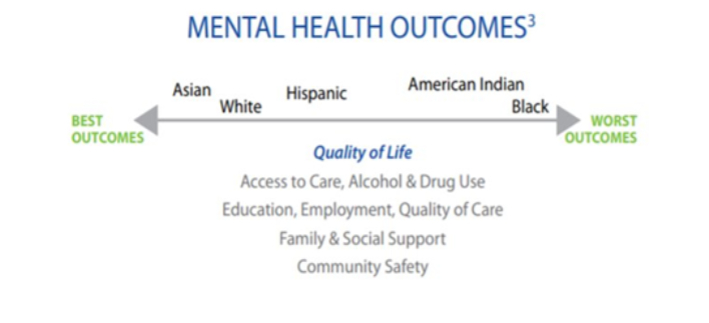“Asians in Wisconsin don’t need any support.”
Though the presenter didn’t say that, it’s what I heard and what I’ve read between the lines countless times before. Just a few weeks ago, I was watching a Zoom presentation about mental health in Wisconsin. It was going well, but quickly turned sour, at least in my eyes, as a Hmong/Asian-American public health professional who works in data. At that moment, the presenters shared the below image with little additional context. In one broad stroke, they painted the picture that all Asians are doing well and have the best mental health outcomes out of all racial/ethnic groups. I sighed and sunk into my chair, feeling even more invisible than when presenters purposely leave out Asian data. But I quickly brushed it off — or so I thought.

However, after hearing about Kao Lee Yang, the UW-Madison Hmong-American Scholar who was denied from being able to compete for a fellowship for underrepresented students, and after listening to Professor Jeung’s powerful keynote at the UW-Madison Diversity 2021 forum about the need to flock together amidst Asian hate, I knew I had to say something.
Why is this “Asian” data problematic?
This data paints the diverse Asian Pacific Islander Desi American (APIDA) community as a model minority monolith and it doesn’t account for the effects of racism stemming from the rhetoric around the COVID-19 pandemic. This is problematic for many reasons.
The pandemic has more than likely worsened mental health outcomes for Asians in the U.S. The dataset for this image was before the pandemic and rise in hate, racism, and violence towards Asians in the U.S. Professor Jeung, co-founder of Stop AAPI Hate and co-author of the Stop AAPI Hate mental health report, estimates that one out of five Asians in the U.S. have experienced a hate incident during the pandemic. According to that report, Asians who experienced racism have heightened symptoms of depression, anxiety, stress, and physical symptoms.
In Wisconsin, the Asian racial category is an umbrella to more than 15 APIDA sub-groups. That’s a lot of different sub-groups with vastly different historical experiences being lumped together. This causes confusion about what “Asian” data actually means and it renders individual communities invisible by erasing all differences between APIDA communities.
Despite the Hmong being the largest APIDA sub-group in Wisconsin, the phone survey used to gather this data isn’t offered in Hmong and there is evidence that mental health outcomes in the Hmong population may be worse than the general population. This is alarming because the Hmong population is the second-largest limited English Proficient (LEP) population in Wisconsin and it means this community isn’t being well represented by this data. Furthermore, a Hennepin County population-level dataset found that 18.3% of Southeast Asians experienced frequent mental distress compared to the average rate of 12.3%. Hennepin County is similar to Wisconsin in that the Hmong are the largest APIDA sub-group and make up the majority of Southeast Asians. We also know that many health disparities exist, with the Hmong often having poorer health outcomes, such as higher rates of type 2 diabetes and some cancers, when compared to the general population.
How is this harmful?
This is harmful because it means less support for APIDA sub-groups who lag behind the general population in health, educational, economic, and other indicators who would greatly benefit from more support. A clear example is Kao Lee Yang; unfortunately, she isn’t alone. Multiple people responded to her Twitter thread sharing similar experiences and we have data on APIDA sub-groups being underrepresented in various fields including STEM fields, senior positions, and political offices. This also means less regard for challenges and racism that the APIDA community face, such as the rise in Anti-Asian sentiment during the pandemic.
So, what can we do?
We can disaggregate Asian data (as Kao Lee mentioned on Twitter); allocate more resources to studies, programs, and supports in the APIDA community; and be more responsible with our data by seeking out community members, properly compensating them, and listening to them as experts of data that is supposed to represent them, with a particular emphasis on informing methods, data collection, and current validity of data. Because I’m tired of feeling invisible as part of a narrative that someone else has written about my community and I know my community deserves better.



































